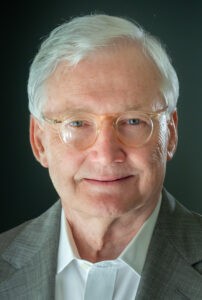You must have a sense of humor to talk about being Baptist these days, with all the craziness associated with the word and with many Baptists today who are a contradiction to what “Baptist” has meant through the centuries.
If Roger Williams, the originating Baptist in America, walked into the annual meeting of the Southern Baptist Convention today, he might well say, “These look more like the ones who threw me out of the Massachusetts Bay Colony than what I had in mind to get started!”

Stephen Shoemaker
We might say “Baptist” is better an adjective than a noun — that is, we are Baptist Christians. If someone asked me “Are you a Baptist?” I might say, “No I am a Baptist Christian with a decidedly ecumenical bent” or, “I’m an ecumenical Christian with some Baptist convictions hanging around trying to survive.”
‘Baptist’ defined
For now, let’s begin with Shoemaker’s Unauthorized Definition of the word “Baptist”: adj., from the Greek baptizo, meaning to “immerse “or “dip.”
- A peculiar, sometimes cantankerous tribe of believers noted for their fierce faith, independent spirit, love of liberty and the sacredness of the individual conscience.
- Baptist Christians trace their roots to 16th century Anabaptists and 17th century English Dissenters. Roger Williams was banished into the wilderness by the Massachusetts Bay Colony for his irregular theology and went on to establish Rhode Island as a colony of religious freedom and religious toleration. Baptists have been vilified, persecuted, jailed and killed, accused of being a mortal danger to both church and state.
- Major Baptist convictions include: Believer’s baptism; “soul competence” and “soul freedom”; local church autonomy; religious liberty for all; and the separation of church and state.
- Baptist means freedom. They have been from the start a “dissenting” people who stand for spiritual freedom and against all forms of tyranny, spiritual and political. So Baptists have a healthy distrust for religious hierarchy, creeds and any alliance between church and state.
- Baptists focus on church with a little “c” rather than a capital “C.” The local church more than the universal church.
- Baptist congregations prefer “covenants” to “creeds.” Covenants describe the kind of people we want to be to one another and in the world. Creeds dictate what we must believe. So Baptists have called themselves a “non-creedal” people. Some have said, “Our only creed is the Bible” — which is another way of saying, “We will not reduce the majesty and mystery of the ocean of who God is to a thimble full of treated water.”
- Because of the freedom of the local church to shape its own life and thought, you will find Baptists from the far-left of the theological and political spectrum to the far right — and everywhere in between. What do Jesse Jackson and Jesse Helms, Jimmy Carter and Lindsay Graham, Jerry Falwell and Martin Luther King Jr. hold in common? All Baptists! Someone said of Baptist worship: “Some burn incense, others bay at the moon.” Some practice historical biblical criticism; others handle snakes. Who knows which is more dangerous?
- Contrary to popular belief and current practice, “Baptist” is not a synonym for “fundamentalist,” “literalist,” “judgmental” or “intolerant.”
- Those of this tribe of Christians can say, “I’m not a member of any organized religion; I’m a Baptist.”
A brief Baptist history
At this point, maybe a touch of history is in order as we explore the meaning of Baptist. Professor Fred Turner said: “Sometimes the present can free us from the shackles of the past and helps build the future. But sometimes something from the past can free us from the shackles of the present and help build the future.”
“Sometimes something from the past can free us from the shackles of the present and help build the future.”
We began as Anabaptists in 16th century Europe. We championed “believer’s baptism,” which said that baptism should be reserved for those who are old enough to know what it means to follow Jesus and who decide to do so.
This was highly threatening to the religious status-quo because it radically asserted that infant baptism was not a true baptism. Thus came the persecutions.
They felt Christianity had sold out to culture. Their radical following of Jesus in the Gospels led them to refuse the taking of oaths, which meant they could not testify in court or serve in the military. They were pacifists and disavowed violence. They took a stand for the complete separation of church and state.
They were called anarchists, seditionists, religious fanatics. They were reviled and persecuted. Some were burned at the stake. Mennonites represent their spirit today. In Holland, an important place for early Baptists, we were called Doopesgesinde, meaning water-minded or baptism-minded. Big Dippers!
Baptists began on British soil in the 17th century as part of the larger movement called Dissenters, Non-conformists and Separatists because they opposed the church/state union of the Anglican Church and the British state. John Bunyan, a Baptist preacher and author of Pilgrims Progress, spent 12 years in prison for refusing to stop preaching without a license from the state.
In America, Roger Williams established Rhode Island as a colony of religious freedom and toleration. Its charter welcomed “Protestants, Papists (Catholics), Turks, (Muslims), and Jews.” The first Jewish synagogue in America was established there, as well as the first Baptist church.
A New Amsterdam (later New York) minister, commenting on Quakers fleeing New Amsterdam wrote: “We suppose they went to Rhode Island, for that is the receptacle of all sorts of riff-raff people and is nothing else but the sewer (latrina) of New England.”
“Today there are hundreds of kinds of Baptist churches. We continue to splinter.”
That sounds like the kind of people Jesus liked to hang around with!
In 1845, the Southern Baptist Convention broke away from the rest of Baptists over slavery. There was no question what side of the Civil War they were on. Paul says in Galatians: “For freedom Christ has set us free.” They held slavery more dear than freedom, not an auspicious beginning.
Today there are hundreds of kinds of Baptist churches. We continue to splinter.
Baptist convictions
Now we move to Baptist convictions.
Conviction No. 1: Believer’s baptism, as described above. Today renegade Baptist churches like ours honor all baptisms while continuing to practice believer’s baptism for ourselves.
Conviction No. 2: “Soul competence” and “soul freedom.” These 17th century words mean every person is spiritually competent to open the Bible and, led by the Spirit, interpret it for their life and faith. And if competent should be free.
As defenders of the sacredness of individual conscience, we have emphasized the individual apprehension of truth. There also is the community apprehension of truth, but we have tended to emphasize the individual side of the coin.
“There also is the community apprehension of truth, but we have tended to emphasize the individual side of the coin.”
This is why we have distrusted creeds. They can be used to coerce individual faith. When British Baptists wrote their London Confession of 1677, they borrowed largely from the Presbyterians’ Westminster Confession of Faith because, as they wrote, “We have no itch to clog religion with new words.”
Conviction No. 3: Local church autonomy. It says that every congregation has the spiritual competence to open the Bible and be led by the Spirit to interpret Scripture for its own life and faith. And if competent must be free.
Every Baptist church is self-governing and self-supporting. As one put it: “Every tub sits on its own bottom.” No larger ecclesiastical body, presbytery, bishop or pope determines its beliefs or what God is calling them to do and to be in the world.
Conviction No 4: Religious liberty and the separation of church and state. We have defended religious liberty, not for ourselves alone, but for all people. Rhode Island became a laboratory for religious freedom and religious toleration. The First Amendment to the U.S. Constitution has Baptist fingerprints on it. The freedom of religion section of the amendment has two clauses: the “freedom clause” which says that religion must be free from government intrusion and control, and the “establishment clause” which says the state cannot “establish,” or favor, one religion over another, or favor religion over non-religion.
As we now enter a national travail over the Supreme Court’s pending decision to end Roe v. Wade, a question arises for me, for us: “Do we want as a nation to enshrine into law one Christian group’s interpretations of Scripture? Within Christian churches and denominations there are a wide variety of positions on abortion. The only passage of Scripture that addresses the issue directly, as to the status of pre-born life, is Exodus 21:22-25, which says if a man is fighting with a pregnant woman and the woman dies, it is a capital offense, but if the woman has a miscarriage because of the fight a fine is assessed, but it is not considered murder. The primary position of Judaism is that life begins at the first breath of birth, as in the creation story when God breathed into us and we became living souls.
“Do we want as a nation to enshrine into law one Christian group’s interpretations of Scripture?”
The First Amendment “establishment” clause prohibits the government from establishing or favoring one religion over another. The founders feared theocracy because of the religious wars that had wracked Europe. We are seeing today the rise of Christian supremacy and theocratic fever. And incredibly, Baptists are among those leading the charge.
What are Baptists to do today?
It is easy to see that many Baptists today represent the opposite of what it has meant to be Baptist through the centuries.
What is a church that calls itself “Baptist” today to do? Here are a series of questions to help us think about this challenge:
- What part of being Baptist do we embrace and what part of being Baptist do we want to let go of?
- Do we want to be “only Baptist” or do we want to embrace a larger Christian vision?
- How do we overcome the obstacles the name “Baptist” puts in the path of someone wanting to become part of us or even wanting to know who we are?
- Does one have to be a “Baptist” in order to be a part of our church? (I imagine that would get a resounding “No!”) What does this mean for us?
- Can we carry on the most important Baptist convictions and hold looser to the name?
- Part of the meaning of being Baptist is the freedom of every congregation to determine who they are and determine their mission. How do we want to use that freedom?
What would it take for your church to witness the best and truest meaning of being Baptist today?
Stephen Shoemaker serves as pastor of Grace Baptist Church in Statesville, N.C. He served previously as pastor of Myers Park Baptist in Charlotte, N.C.; Broadway Baptist in Fort Worth, Texas, and Crescent Hill Baptist in Louisville, Ky.
Related articles:
Meet the Baptist pastor who helped cultivate the Lost Cause narrative
History shows the view is best from the margins | Opinion by David Gushee
Knowing our history does not make us anti-American | Opinion by Russ Dean

